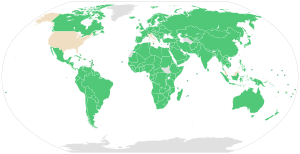Persistent organic pollutant facts for kids
Persistent organic pollutants (often called POPs) are special kinds of chemicals. They are called "organic" because they contain carbon, like many things found in nature. What makes POPs unique is that they don't break down easily in the environment. This means they can stay around for a very long time, sometimes for many years!
Because they last so long, POPs can travel far from where they were first released, even across continents. They can also build up in living things, like plants, animals, and even humans. When these substances move up the food chain (for example, a small fish eats tiny plants with POPs, then a bigger fish eats the small fish, and a bird eats the bigger fish), the amount of POPs can get much larger. This is why POPs can have a big impact on the health of people and the environment.
Where Do POPs Come From?
Many POPs were once used as pesticides. Pesticides are chemicals used to kill pests that harm crops. Other POPs are used in factories to make different products. For example, some are used as solvents (liquids that dissolve other substances) or in making plastics like polyvinyl chloride. A few POPs can be found naturally, but most of them are made by humans. They are either made on purpose for certain uses or are created as unwanted byproducts during industrial processes.
Why Are POPs a Problem?
POPs are a problem because they can harm living things. Since they build up in the tissue of animals and humans, they can cause various health issues. These issues can affect how bodies work, including the nervous system and the immune system. Because POPs can travel far, they can affect places very distant from where they were first released, like the Arctic, even though no POPs are made there.
What Is Being Done About POPs?
Many countries around the world are working together to control and stop the use of POPs. One important agreement is called the Stockholm Convention on Persistent Organic Pollutants. This international treaty aims to protect human health and the environment from POPs. It works by trying to reduce or get rid of the production and use of these dangerous chemicals. The convention also helps countries find safer alternatives to POPs.
See also
 In Spanish: Contaminante orgánico persistente para niños
In Spanish: Contaminante orgánico persistente para niños
 | Tommie Smith |
 | Simone Manuel |
 | Shani Davis |
 | Simone Biles |
 | Alice Coachman |


